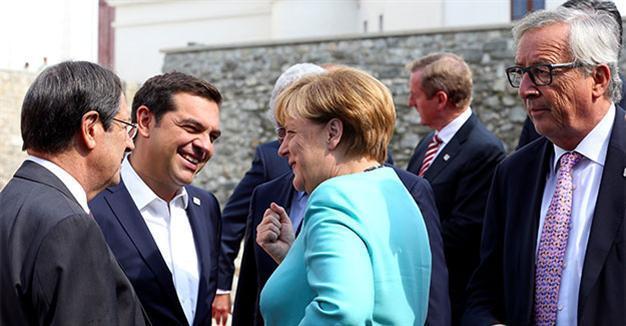EU leaders meet without UK to discuss ‘road map’ after Brexit
BRATISLAVA

Germany's Chancellor Angela Merkel talks with Greek Prime Minister Alexis Tsipras during a family photo at the European Union summit - the first one since Britain voted to quit - in Bratislava, Slovakia, September 16, 2016. REUTERS photo
The European Union’s 27 member states began discussions on Sept. 16 to draw up a new road map for the future after the U.K.’s decision to leave the bloc, focusing on defense cooperation and border security in a bid to heal deep divisions in particular over migration.The 27 leaders - minus British Prime Minister Theresa May - say they want to show they can respond to the challenges of mass migration, security, globalization and a stuttering economy.
EU Term President Slovakian Prime Minister Robert Fico said the informal summit in Bratislava would create an opportunity for honest discussions among the member states, as the EU project faces growing skepticism among member states.
“After Brexit and the risks that are associated with it, it is absolutely necessary to meet and to be very honest,” Fico told reporters at the entrance of the historical Bratislava castle, where leaders of 27 EU member states gathered, without the U.K., to discuss the future of the bloc.
German Chancellor Angela Merkel warned on Sept. 16 that the EU faces a “critical situation” post-Brexit.
Merkel’s influence as leader of the EU’s biggest economy has been undermined by her unpopular decision to open Germany’s doors last year to nearly a million refugees.
“We are in a critical situation. We have to show with our actions that we can get better,” Merkel said as she arrived at the special summit, held in the Slovak capital’s towering castle overlooking the River Danube.
“I hope that Bratislava shows we want to work together and we want to solve the problems which we have in Europe,” she added.
French President Francois Hollande, the other half of the EU’s “power couple” with Merkel, was equally blunt about the task ahead.
“We face either break-up, weakening - or we choose the opposite, together giving Europe a purpose,” said Hollande, who has made common cause with Berlin on boosting EU defense cooperation.
EU President Donald Tusk had warned on the eve of the summit that leaders must “have a sober and brutally honest assessment of the situation.”
The EU leaders have said they want to launch a “Bratislava Process” of reforms at this summit, to be further discussed in Malta early next year and then agreed in Rome in March 2017 to mark the 60th anniversary of the founding of the EU.
















